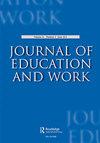Communities of practice for contemporary leadership development and knowledge exchange through work-based learning
IF 1.7
Q2 EDUCATION & EDUCATIONAL RESEARCH
引用次数: 0
Abstract
ABSTRACT This study explores the experiences of leaders who have led organisations and teams through an extended period of crisis management whilst completing a UK work-based master’s programme. This paper examines contemporary approaches to work-based learning and explores the effect of organisational and workforce demands in a volatile era of global economic uncertainty. Theoretical and conceptual foundations relating to experiential learning, digital education and communities of learning are analysed and discussed. Taking an inductive qualitative approach, the study analyses semi-structured questionnaire data from senior leaders. The widespread adoption of technology exposes challenges to facilitation and the academic-employer interface, impacting upon learning communities and knowledge exchange opportunities. The findings also suggest enhanced leaders’ adaptive traits, including confidence and self-reliance. This study illuminates critical issues associated with contemporary work-based learning, specifically relating to prolonged macro uncertainty and the effect upon workplaces as sites of knowledge and learning, and risks to dynamic relationships between the psychosocial work environment, genuine opportunities to learn and learner well-being. This work seeks to inform the design of future programs, specifically in terms developing inter and intra-organisational communities of learning and knowledge exchange to enhance best practice and inculcate crucial leadership skills.通过基于工作的学习促进当代领导力发展和知识交流的实践社区
摘要本研究探讨了在完成英国在职硕士课程的同时,领导组织和团队进行长期危机管理的领导者的经验。本文考察了当代基于工作的学习方法,并探讨了在全球经济不确定性的动荡时代,组织和劳动力需求的影响。分析和讨论了与体验式学习、数字教育和学习社区有关的理论和概念基础。本研究采用归纳定性的方法,分析了来自高层领导的半结构化问卷数据。技术的广泛采用暴露了便利化和学术雇主界面方面的挑战,影响了学习社区和知识交流机会。研究结果还表明,领导者的适应能力得到了增强,包括自信和自立。这项研究阐明了与当代基于工作的学习相关的关键问题,特别是与长期的宏观不确定性和对作为知识和学习场所的工作场所的影响,以及心理社会工作环境、真正的学习机会和学习者幸福感之间动态关系的风险有关。这项工作旨在为未来计划的设计提供信息,特别是在发展组织间和组织内的学习和知识交流社区方面,以加强最佳实践并灌输关键的领导技能。
本文章由计算机程序翻译,如有差异,请以英文原文为准。
求助全文
约1分钟内获得全文
求助全文
来源期刊

Journal of Education and Work
EDUCATION & EDUCATIONAL RESEARCH-
CiteScore
2.70
自引率
14.30%
发文量
40
期刊介绍:
The Journal of Education and Work is an international forum for academic research and policy analysis which focuses on the interplay of the education and economic systems. The journal examines how knowledge, skills, values and attitudes both about and for work and employment are developed within the education system. The journal also explores the various forms of industrial training and accreditation in the economic system, including changes in the economic and industrial infrastructure which influence the type of employees required. Work in the informal economy is also included.
 求助内容:
求助内容: 应助结果提醒方式:
应助结果提醒方式:


